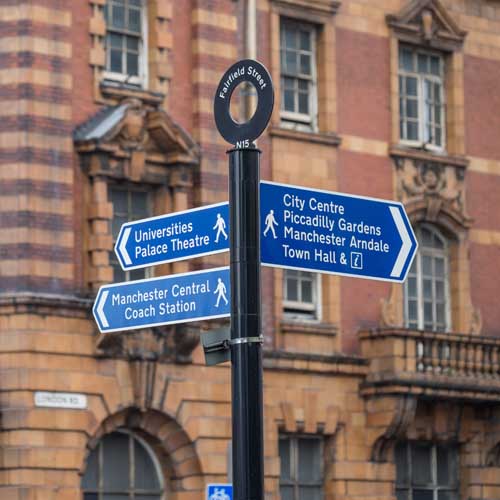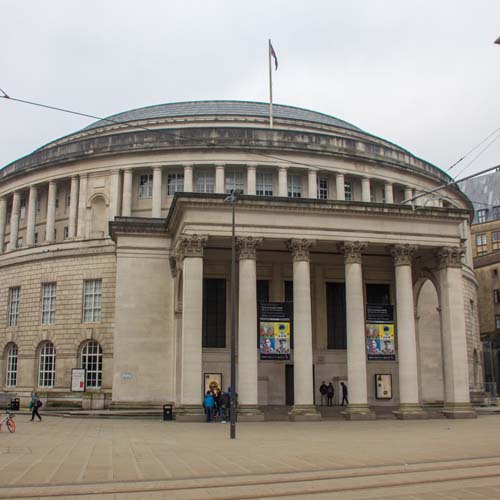Manchester was the first place in Britain, in 1807, to petition Parliament to end the transportation of slaves. During the American Civil War, Liverpool took the side of the Southern American States, flew the Confederate flag and sent ships out to help the slave owners and to fight against the Northern States.
Manchester and the surrounding areas, including the county of Yorkshire, boycotted the goods that came from slaves and were on the side of the Northern States. This led to The Cotton Famine in Lancashire and Yorkshire. Abraham Lincoln wrote a letter to the people of Manchester to thank them for their role in the war, and a statue of him stands on a plinth in Lincoln Square behind Albert Square in Manchester.
William Steffe, circa 1830 – circa 1890, is credited with writing ‘John Brown’s Body’ for a camp meeting song with the refrain “ Glory Hallelujah” in the mid 1850s.
‘John Brown’s Body’ was written about American abolitionist leader John Brown. Brown led anti-slavery volunteers in Bleeding Kansas, a state-level war over Kansas being a slave state or a free state. In 1859 he led a raid on the federal armoury intending to start a slave liberation movement. On December 2nd 1859 he was hanged, being the first person executed for treason in the history of the United States.
‘Glory, Glory, Hallelujah’ was written by abolitionist writer Julia Ward Howe. Howe wrote the lyrics to the music of the song ‘John Brown’s Body’ in 1861 after her and her husband met with Abraham Lincoln in Washington D.C.
Hector Nicol was a Scottish singer, comedian and actor who is thought to have recorded “Glory Glory to the Hibees” for Hibernian in the 1950s.
In 1960 Tottenham Hotspurs prevented Wolverhampton Wanderers from doing the domestic double, a feat only achieved twice before in the 1800s. In 1889 Preston North End beat Wolverhampton Wanderers 3-0 in the FA Cup final after being crowned league winners. Just eight seasons later Aston Villa beat Everton 3-2 on their way to winning the double.
In 1961 Spurs won the league and beat Leicester City 2-0 in the FA Cup final to clinch the domestic double, and earned them a place in the European Cup competition.
When Spurs played Górnik Zabrze in the 1961-62 European Cup, their tough tackling in Poland led to them being labelled ‘no angels’ by the Polish press.
Some fans dressed as angels for the home leg which Spurs won 8-1 to the chorus of ‘Glory, Glory, Hallelujah’. Members of the Spurs 1967 FA Cup winning team recorded ‘The Spurs Go Marching On’. Alongside Chaz and Dave, the 1981 FA Cup winning side released ‘Glory, Glory, Tottenham Hotspur’, a B-Side to ‘Ossie’s Dream.’
In 1968 Manchester City won the First Division after notching up two more points than Manchester United who won the European Cup by beating Benfica 4-1 at Wembley a few weeks later. In September 1968, Leeds United beat Ferencváros by a solitary goal over two legs to win the forerunner to the UEFA Cup, the Inter Cities Fairs Cup. To celebrate, Ronnie Hilton released ‘Glory, Glory, Leeds United’. The first word in that song is Manchester!
“Manchester can rave about the Summerbee and Best. Then there’s Liverpool and Arsenal and Spurs and all the rest. But let us sing the praises of the lads we love the best. As Leeds go marchin’ on.”
The Manchester United team recorded ‘Glory, Glory, Man United’ at Strawberry Studios in Stockport in 1983 after reaching the FA Cup final. The reds beat Brighton and Hove Albion 4-0 in a replay after the final ended 2-2. Strawberry Studios was founded by 10CC and it is the same studio where all Factory Records artists produced their records. Martin Hannett was the same producer who worked on ‘Boys In Blue’ in 1972 with the Manchester City team and 10CC, who are all Manchester City fans.
OMD, Nico from Velvet Underground, Happy Mondays, Paul McCartney, The Smiths, The Stone Roses, James, Ramones, Dr. John and Joy Division are some of the acts that Hannett produced earning him the nickname ‘Genius’.
His gravestone in Southern Cemetery in South Manchester reads “Martin Hannett 1948 – 1991 Husband Of Wendy, Father Of James And Tania, Record Producer And Creator Of The Manchester Sound”.
George F Root wrote the lyrics and music and published ‘Tramp! Tramp! Tramp!’ in 1864 to give hope to Union prisoners of war. The words to the chorus are “Tramp! Tramp! Tramp! The boys are marching. Cheer up comrades, they will come. And beneath the starry flag, we shall breathe the air again. Of the free land in our own beloved home.”
Manchester United fans have a song which uses the same melody as
‘Tramp! Tramp! Tramp!’
“Who’s that team they call United ?
Who’s that team they all adore ?
They’re the boys in red and white
And they play with all their might
And they’re out to show the world how they can score!
So bring on Sunderland and Arsenal
Bring on the Spaniards by the score
Barcelona, Real Madrid
They may make a gallant bid
But they’ll only find the reason why we roar”
In 1985 the Manchester United team released a record to celebrate making it to the FA Cup final. They also used the melody of ‘Tramp! Tramp! Tramp!’
The team went on to beat Everton with a Norman Whiteside goal, after Kevin Moran became the first player to be sent off with a red card in an FA Cup final.
The chorus was: ‘We all follow Man United
We’re all going to Wembley
And we’ll really shake ‘em up
When we win the FA Cup
‘Cos United are the greatest football team
United are the greatest football team.’
Henry Clay Work, 1832 – 1884, wrote Marching Through Georgia. Work’s family home became a stop on the Underground Railroad, assisting runaway slaves to freedom in Canada, for which his father was once imprisoned.
The words to the chorus are “Hurrah! Hurrah! We bring the jubilee. Hurrah! Hurrah! The flag that makes you free. So we sang the chorus from Atlanta to the sea. While we were marchin’ through Georgia.”
The Billy Boys was written to the music of Marching through Georgia and is popular with Rangers fans in Scotland.
A popular chant with United fans is: “Hello! Hello! We are the Busby Boys. Hello! Hello! We are the Busby Boys. And if you are a City fan, surrender or you’ll die. Cos we all follow United.”
Jim Connell, March 1852 – February 1929, wrote ‘The Red Flag’ in 1889. Connell was born in Kilkyre in Meath, the same County my mum was from in Eire. Connell joined the Irish Republican Brotherhood and worked in Dublin as a docker where he was blacklisted for attempting to unionise the workers.
He moved to London and worked on Keir Hardie’s newspaper ‘The Labour Leader’. For a decade, Connell was a member of the Social Democratic Federation (SDF), led by Henry Hyndman, who aimed to promote the need for land reform in Ireland amongst the workers of England.
‘The Red Flag’ is a socialist song and emphasises the solidarity of the International Labour movement. It is the anthem of the British Labour Party, Northern Irish Social Democratic and Labour Party, and the Irish Labour Party. Translated versions are sung in Japan and Korea.
The fourth verse of The Red Flag makes reference to the American Civil War with the following lyrics:
It well recalls the triumphs past,
It gives the hope of peace at last;
The banner bright, the symbol plain,
Of human right and human gain.
On February 5th 1958 Manchester United drew 3-3 with Red Star Belgrade in Yugoslavia after having won the first 2-1 at home in the quarter finals of the European Cup.
On February 6th 1958, Manchester United’s BEA plane crashed on its 3rd attempt to take off from Munich-Riem Airport.
23 people died including eight journalists and five of the players who played for the United team the evening before. Frank Swift, a former Manchester City goalkeeper and teammate of Matt Busby was amongst the journalists who died. Matt Busby previously played for Manchester City.
After signing for a world record fee just a few months before, Manchester United’s goalkeeper was Northern Ireland international Harry Gregg. Gregg managed to rescue several teammates from the wreckage. Amongst them was fellow international Jackie Blanchflower from Belfast who helped the team win the domestic league for two seasons prior. Jackie’s eldest brother Danny played for Tottenham Hotspur and captained them a few years later, helping them do the double in 1961.
‘Red Flag Flying High’
United’s flag is deepest red
It shrouded all our Munich dead
Before their limbs grew stiff and cold
Their hearts’ blood dyed its every fold
Then raise United’s banner high
Beneath its shade we’ll live and die
So keep the faith and never fear
We’ll keep the red flag flying here
We’ll never die, we’ll never die
We’ll never die, we’ll never die
We’ll keep the red flag flying high
‘Cos Man United will never die.
The Red Flag by Billy Bragg contains similar lyrics :
The people’s flag is deepest red
It shrouded oft our martyred dead
And ‘ere their limbs grew stiff and cold
Their hearts’ blood dyed to every fold
Then raise the scarlet standard high
Beneath its folds we’ll live and die
Though cowards flinch and traitors sneer
We’ll keep the red flag flying here




